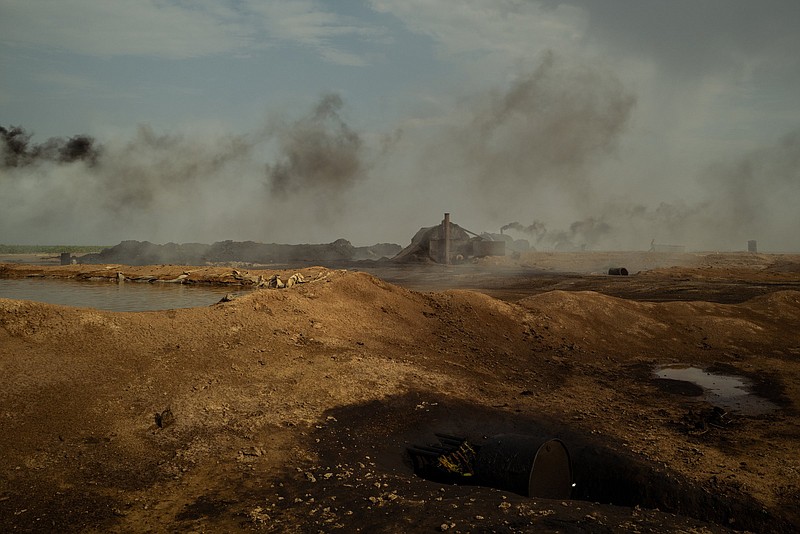HASAKAH, Syria -- As U.S. forces withdrew from Afghanistan, precipitating the chaotic collapse of its government, another American ally watched warily and hoped that its fate will be different.
The painful memories of an earlier American military drawdown are still fresh for the Kurdish-led Syrian Democratic Forces in northeastern Syria.
President Donald Trump blindsided his generals three years ago by announcing a withdrawal of the 2,000 U.S. troops allied with the Democratic Forces in fighting the Islamic State. Though he was later persuaded not to remove the entire force, he did cut it by more than half the next year, clearing the way for the force's adversary, Turkey, to invade part of the territory.
The American move was widely criticized as a betrayal of the Kurds, who had lost thousands of fighters during the campaign against the Islamic State.
"The impact of that will last forever," said Gen. Mazloum Kobane Abdi, the Democratic Forces' top commander and Washington's strongest ally in Syria, in a rare interview.
About 900 American troops remain stationed in an expanse of northeastern Syria that lies outside government control. They are part of the fight against the Islamic militants, who are estimated by the U.S.-led military coalition to number between 8,000 and 16,000 in Syria and Iraq.
In recent months, the Biden administration has sought to reassure Mazloum and others in the Syrian Democratic Forces, sending Gen. Kenneth McKenzie, who heads U.S. Central Command, and Joey Hood, acting assistant secretary of state for Near Eastern Affairs, to the region for talks, officials said. The administration has stressed that the partnership remains strong and that American troops will not be leaving, according to Democratic Forces and U.S. officials.
Mazloum struck a cautious but optimistic tone about the future of the U.S. presence. Describing an improved relationship with Washington since President Joe Biden took office, the general said he expected relative stability to prevail in northeastern Syria "if America keeps its promises."
"We feel now that we have stronger political and military support, more than we had from the previous administration," Mazloum said in the interview at a military base last month. "After these pullouts, there were U.S. officials who came to tell us that there will be no changes in Syria."
U.S. officials describe Mazloum as a steady hand and trusted ally in the fight against the Islamic State. The U.S.-led coalition continues to provide intelligence and carry out airstrikes to support Syrian Democratic Forces efforts to roll up sleeper cells and target the group's surviving leadership. The coalition also works with the force to patrol local oil fields.
The balance of power in Syria's multisided conflict depends on the American presence. Where U.S. troops retreat, American officials see an opening for the Syrian military or forces from Russia or Turkey to advance. Some U.S. officials have stressed that the American deployment precludes Iranian forces from establishing a land bridge that would allow them to more easily supply weapons to their Hezbollah allies in Lebanon.
"It's about keeping a balance," said one senior official, speaking on condition of anonymity because he was not authorized to speak with the media.
The partial American withdrawal in 2019 redrew the map of northeast Syria, ceding some territory once patrolled by U.S. forces to a Turkish-backed Syrian militia force and in other places to the Syrian army and its Russian backers.
The American pullback came after Trump gave Turkish President Recep Tayyip Erdogan a green light to send his military deeper into Syria in a bid to clear the area of the Syrian Democratic Forces. The Turkish government considers the Kurdish-led force to be an affiliate of the militant Kurdistan Workers' Party, a separatist group in Turkey that Ankara calls terrorists. Nearly 200,000 civilians who had been living in Syrian areas under Democratic Forces control scrambled for safety.
Although the front lines between the Syrian Democratic Forces and Turkish-backed forces are largely quiet for now, cross-border violence can still flare. Earlier this month, shelling blamed on Turkey or its local allied force struck a home in the town of Ain Issa, killing four members of a family, according to doctors and relatives. In her hospital bed last week, Khitam Hilal, one of the survivors, swam between moments of sedated haze and painful clarity.
"They killed my husband," she said, eyes fixed on the ceiling and full of tears. "What did we do to them?"
Information for this article was contributed by Mustafa al-Ali in Hasakah and John Hudson of The Washington Post.
